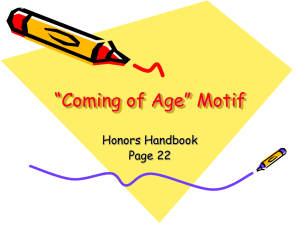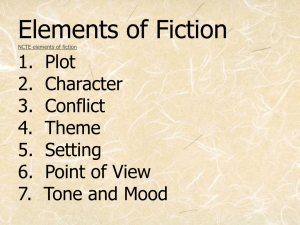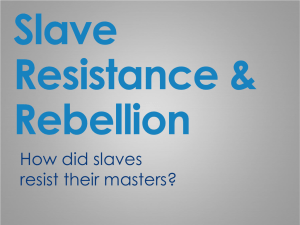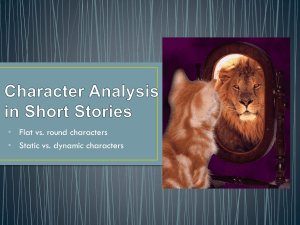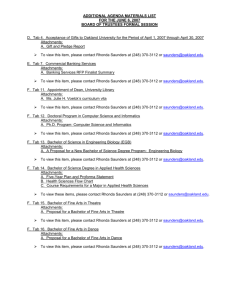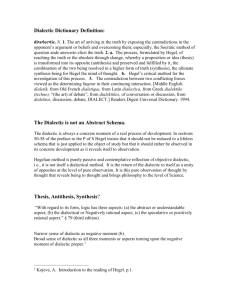File
advertisement
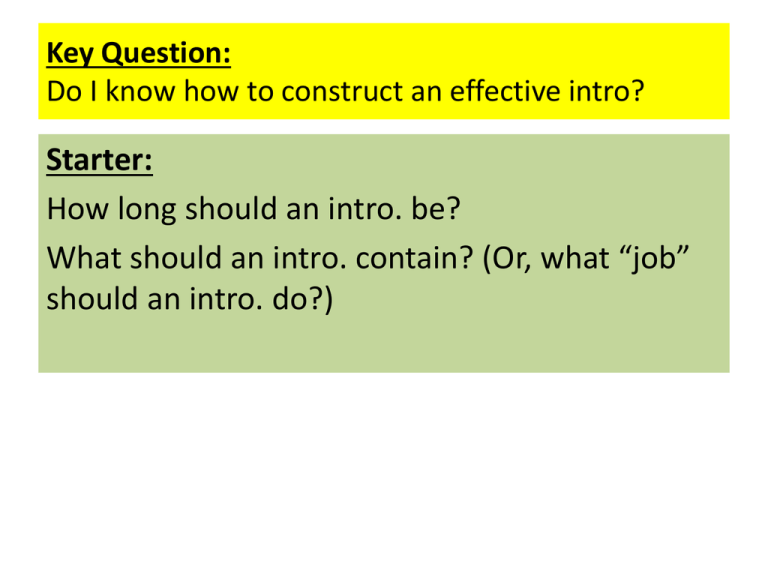
Key Question: Do I know how to construct an effective intro? Starter: How long should an intro. be? What should an intro. contain? (Or, what “job” should an intro. do?) What NOT to do: Do NOT: • Retell the story • Re-state/describe the question Avoid statements that can be paraphrased as “I intend to do what my title suggests I will do.” This means that the form the title/question takes is important. Questions/Titles • Titles that are too broad may not be that helpful (e.g., “A Marxist Reading of…”) • “To what extent” questions can invite a little too much description and a little too much “fence-sitting” (e.g., “To what extent does…?” leads to conclusion along the lines “This text does… to some extent.”) Titles & Intros Title: • Develop plausible statement, with which you disagree Intro: 1. Very brief intro. to text 2. State problem 3. Outline solution (this is your thesis; you do not need to PEE everywhere yet!) 4. Anticipate what the reader will need to know, in order to make sense of the main argument (this sets up Main Section [a]) Title: • Develop plausible statement, with which you disagree Intro: 1. Very brief intro. to text 2. State problem 3. Outline solution (this is your thesis; you do not need to PEE everywhere yet!) 4. Anticipate what the reader will need to know, in order to make sense of the main argument (this sets up Main Section [a]) “In Saunders’s ‘Pastoralia,’ the nameless narrator avoids becoming a commodity through the creative act of telling his own story.” Discuss. [1] George Saunders’s story “Pastoralia” is a satirical yet tragic depiction of contemporary American life, and the corporate greed that drives it. [Critical link – AO3] In many ways, Saunders stages what the critic Fredric Jameson calls “the logic of late capitalism,” the idea that every aspect of life, not just the “world” of work, is shaped by capitalist interests and forces (Jameson, 1989). [2] Because he tells his own story, some might argue, Saunders’s nameless protagonist and narrator avoids becoming a commodity: the simple act of self-expression could mean that the narrator is viewed as a creative individual, and not merely a “thing” owned by his bosses. [3] However, in what follows I will argue that, in fact, the protagonist’s story is a record of his commodification by capitalist forces, represented most clearly by the character Nordstrom and the anonymous notes sent to the protagonist by a faceless, impersonal Management. [4] “Commodification” is a key term in Marxist theory, one which cannot be fully understood apart from the linked concepts of alienation and alienated labour. To understand these ideas in relation to “Pastoralia,” then, we must first consider them in isolation. “In Saunders’s ‘Pastoralia,’ the nameless narrator avoids becoming a commodity through the creative act of telling his own story.” Discuss. [1] George Saunders’s story “Pastoralia” is a satirical yet tragic depiction of contemporary American life, and the corporate greed that drives it. [Critical link – AO3] In many ways, Saunders stages what the critic Fredric Jameson calls “the logic of late capitalism,” the idea that every aspect of life, not just the “world” of work, is shaped by capitalist interests and forces (Jameson, 1989). [2] Because he tells his own story, some might argue, Saunders’s nameless protagonist and narrator avoids becoming a commodity: the simple act of self-expression could mean that the narrator is viewed as a creative individual, and not merely a “thing” owned by his bosses. [3] However, in what follows I shall argue that, in fact, the protagonist’s story is a record of his commodification by capitalist forces, represented most clearly by the character Nordstrom and the anonymous notes sent to the protagonist by a faceless, impersonal Management. [4] “Commodification” is a key term in Marxist theory, one which cannot be fully understood apart from the linked concepts of alienation and alienated labour. To understand these ideas in relation to “Pastoralia,” then, we must first consider them in isolation. Approx. 185 words Today: Developing plans and drafting segments/sections of “Pastoralia” essays Starter • Look at the sheet “Suggested Essay Structure” • In what order do you plan/write your essays? Use the section headings and put them in the order in which you tend to work. Planning Main Sections (a) & (b) Main Section (a) • Cannot be a full account of the field (Marxism/Aesthetic theory etc.) • But it can be an overview of the field as it relates to your essay. E.g: – You can’t review Marx and Marxism as a whole – But if you’re going to use the concept(s) of alienation and/or base/superstructure, you can introduce and outline them here Planning Main Sections (a) & (b) RECAP FROM LAST WEEK: • Which terms/ideas/concepts/issues are going to be useful to you? • List them/brainstorm them now • Do you have sources for these ideas? • Where you do, make a note of these now, using the format for bibliographies and references we’ve used before. • Where you do not, highlight these; ask a friend, ask me, and/or find possible sources for tomorrow’s lesson (make a note of them in you PEST/SALAD) Remember: Additional ideas discussed (try using these in the Pastoralia essay, as an experiment; they are not absolutely necessary): • Plato’s cave • Baudrillard’s “hyperreal”/“hyperreality” • Hegel’s master/slave dialectic – Dialectic: In Hegel, this describes the process by which knowledge is established and developed; in Hegel it has specific stages, but it is o.k. to loosely think of “dialectic” as “argument” or “debate” (in an academic, “rational” sense) Hegel’s master/slave dialectic • • • • • • • • In order to assert my individuality, I need someone else to recognise me as an individual But if we all require this of others, then we will always be in conflict with others This conflict could be to the death; instead, one person will voluntarily become subservient (will become the slave) The master does not receive full recognition from slave, as the recognition is on pain of death (condition of slavery is voluntary, but recognition of the other is not) Additionally, master becomes entirely dependent on slave, while slave’s ingenuity and activity mean that the slave is constantly expressing “himself,” and therefore receiving confirmation of “his” individuality in the products of “his” work and “his” relationship with nature A metaphor that might describe: relationships between persons; the growing national consciousness/identity; the development of minds Hegel seemed primarily to be working on a metaphor of “mind” or “spirit,” as part of a discussion of how we might understand true reality, and therefore attain true freedom. But the master/slave dialectic can also describe the sorts of power dynamics that Marxists and Feminists are interested in (Hegel was an important influence on Marx) Now, write 1-2 paragraphs outlining/introducing/exploring the key terms/ideas you will use. Try to make simple links to “Pastoralia” at this point; they do not need to be developed, however. Some sentence “stems” that might help: _______ is a particularly influential idea/concept in _________ theory. It refers to/describes/connotes suggests... __________ theory has had a profound influence on the study of literature, because of its interrogation of/the light it sheds on/its critique of... The idea of _________ will be central to my essay, because of the light it sheds on _____ in “Pastoralia.” While a detailed overview of ________ theory is not possible, it is worth briefly considering the notions of _________, as they are central to the discussion that follows. DO THIS ON PAPER & FINISH FOR H/W One of the issues that ________ theory raises is...




